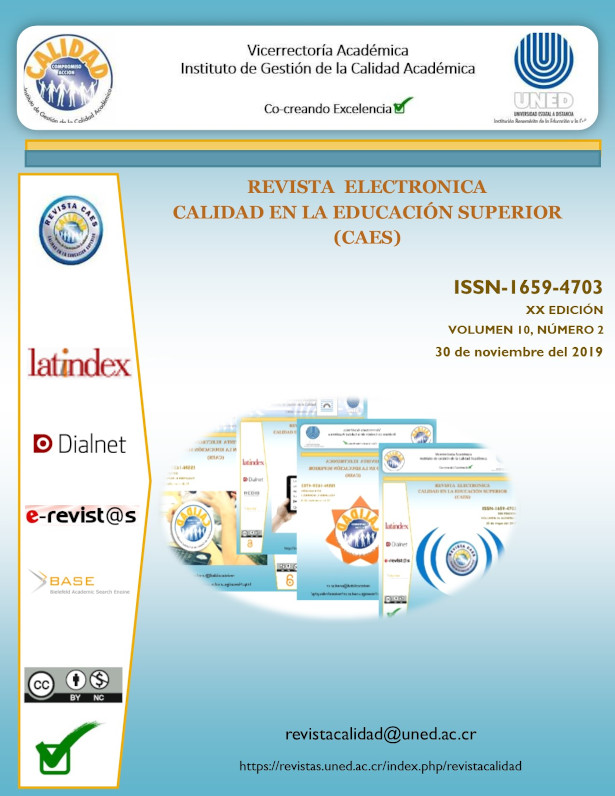Mathematics learning based on the science context
Mathematics learning based on the science context
DOI:
https://doi.org/10.22458/caes.v10i2.2603Keywords:
study cases, mathematical education, teaching innovation strategiesAbstract
This teaching innovation work aims to promote understanding on fundamental mathematics topics such as equations and functions, through the related sciences contextualization. In addition to strengthening the reflective and intuitive thinking ability, for the context problems resolution through different strategies.The methodology, contextual learning theory REACT was addressed; in four stages: Master class, Case studies design, Cases application in the classroom, Contextual learning evaluation and monitoring. Among the most relevant results, it can be mentioned that 90% increased their interest by the mathematics study. In conclusion, the contextual learning method provides the student with a stronger academic base and facilitates the mathematical concepts understanding that relate to their professional environment.
References
Barrera, L. y Monge, R. (2015). Estudio de Casos: una estrategia para la enseñanza de la matemática en programas de formación inicial de profesores. En Editor Parraguez, M., Rivas, H., Vásquez, C., Pincheira, N., Solar, H., Rojas, F. Y Chandía, E. (Eds.), XIX Jornadas Nacionales de Educación Matemática (pp. Inicial-final). Villarica-Chile.
Camarena, P. (2013). A treinta años de la teoría educativa" Matemática en el Contexto de las Ciencias". Innovación educativa, 13(62), 17-44.
Carraher, T., Carraher, D. y Schliemann, A. (1999). En la vida diez, en la escuela cero. Siglo XXI.
Cuenca, L., Jiménez, Y. y Castillo, D. (2018). Enseñanza superior de las matemáticas y cálculo: diseño y aplicación de un sistema de evaluación de aprendizajes basado en contextos. Conference Proceedings EDUNOVATIC 2017. REDINE (Ed). Eindhoven, NL: Adaya Press. Obtenido de: http://www.adayapress.com/wp-content/uploads/2018/02/EDUNOVATIC2017.pdf
Gamboa, R. (2007). Uso de la tecnología en la enseñanza de las matemáticas. Cuadernos de investigación y formación en educación matemática 2(3), 11-44.
Gravemeijer, K. y Terwel, J. (2000). Hans Freudenthal: a mathematician on didactics and curriculum theory. Journal of curriculum studies, 32(6), 777-796.
Jiménez, Y. (2018). Estrategias lúdicas para la enseñanza-aprendizaje de la matemática a nivel superior. Transforming education for a changing world, 170.
Jiménez, Y., Castillo, D. y Vivanco, O. (2017). Educación de calidad mediante la estrategia Design Thinking. Conference Proceedings EDUNOVATIC 2017. REDINE (Ed). Eindhoven, NL: Adaya Press. Obtenido de: http://www.adayapress.com/wp-content/uploads/2018/02/EDUNOVATIC2017.pdf
Jiménez, Y., Bautista, E., Carrillo, I., Castillo, D., Feijoo, D. y Vivanco, O. (2018). Simulation technologies to strengthen teaching-learning skills in Biochemistry, Nursing and Medical students. Revista Latinoamericana de Políticas y Administración de la educación.
Khan, S. (2007). Khan Academy. Página web. https://es.khanacademy.org/ . Visitada el 20/02/2019.
Kolb, D. A. (1984). Experiential learning Prentice Hall. Englewood Cliffs, NJ.
Miller, G. E. (1990). The assessment of clinical skills/competence/performance. Academic medicine, 65(9), S63-7. https://doi.org/10.1080/01421590701551185
Pallascio, R., Allaire, R. & Mongeau, P. (1992). Spatial representation and the teaching of geometry. Structural Topology 1992 núm 19. Obtenido de http://hdl.handle.net/2099/1084
Parra, S. H. (2013). Claves para la contextualización de la matemática en la acción docente. Omnia,19(3), 74-85.
Pimienta, J. H. & De la Orden, A. (2012). Metodología de la investigación: Competencias+ Aprendizaje+ Vida. Área bachillerato/humanidades (México).
Pimienta, J. H. (2012). Estrategias de enseñanza-aprendizaje Docencia universitaria basada en competencias. México: Editorial PEARSON
Puig, L. (1997). Análisis fenomenológico. La educación matemática en la enseñanza secundaria, 61-94.
REACTing to Learn: Student Engagement Strategies in Contextual Teaching and Learning (2019). Obtenido de http://www.cord.org/REACTflyer_website.pdf . Visitada el 10/02/2019.
Shorser, L. (1999). Bloom’s Taxonomy Interpreted for Mathematics.
Tobón, S. (2018). Conceptual analysis of the socioformation according to the knowledge society. Knowledge Society and Quality of Life (KSQL), 1, 9-35.
Vivanco-Galván, O. A., Castillo-Malla, D. y Jiménez-Gaona, Y. (2018). HACKATHON multidisciplinario: fortalecimiento del aprendizaje basado en proyectos. Revista Electrónica Calidad en la Educación Superior, 9(1), 119-135.
Yzaguirre, L. E. (2005). Calidad educativa e ISO 9001: 2000 en México. REICE. Revista Electrónica Iberoamericana sobre Calidad, Eficacia y Cambio en Educación.
Wells, A. y Carter, K. (1999). Preliminary tests of a cognitive model of generalized anxiety disorder. Behaviour Research and Therapy, 37(6), 585-594.
Zamora, P. J. (2013). La contextualización de las matemáticas. España: Universidad de Almería
Downloads
Published
How to Cite
Issue
Section
License
Esta revista provee acceso libre inmediato a su contenido bajo el principio de que hacer disponible gratuitamente la investigación al publico, lo cual fomenta un mayor intercambio de conocimiento global.
